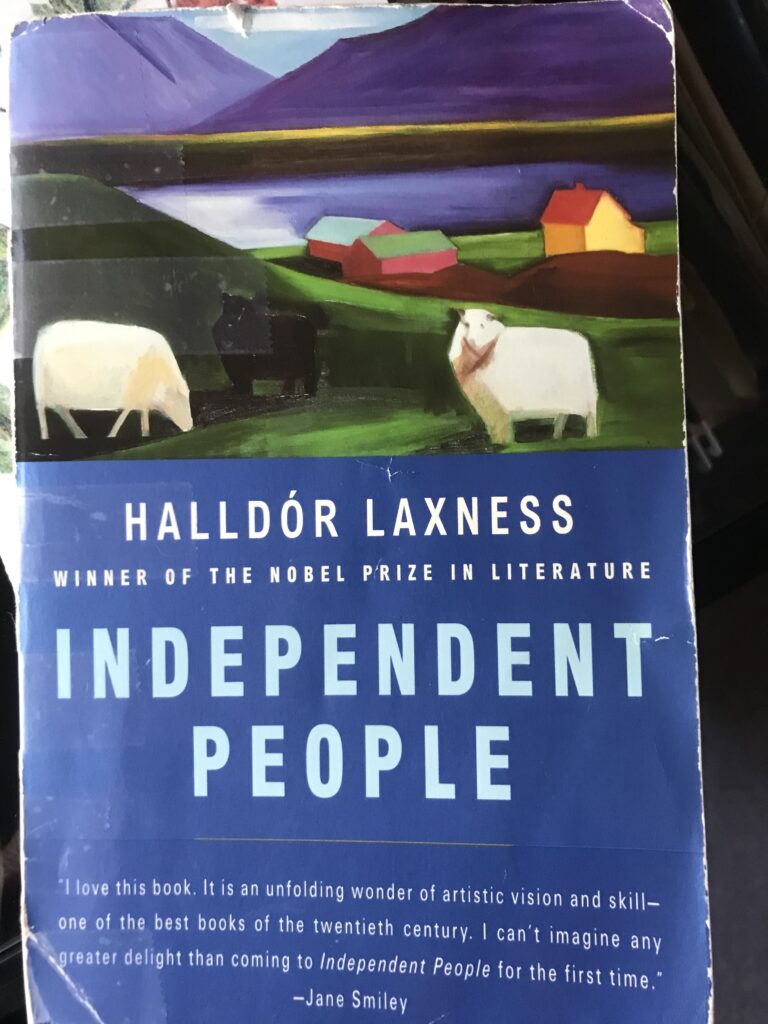
You might call Independent People, by Halldór Laxness, the Moby Dick for sheep. It has a protagonist who is impossible, stubborn, focussed only on being self-sufficient, prideful, thrifty and, not unlike Mr. Ahab, refuses to turn back after making a fateful decision without regard for others. Set in early 20th century Iceland, this amazing novel invites us, no insists, that we live in the dismal conditions of Bjartur of Summerhouses. He owns sheep and, at times, has a wife. There are children, an elder, and did I say sheep? Like Moby Dick, the novel is full of sly social commentary, and in long discussions, topics covered range from communism, taxes, agricultural policy, interest rates and whether or not there is an evil spirit afoot in the valley where they live.
Several of the others countered with their opinions, though without shedding much light on the problem, and Olafur even referred to a book, several pages of which a friend of his had once obtained as wrapping paper around some cups, in which it was flatly denied, according to evidence furnished by foreign scientists, that evil so much as existed.
Bjartur is a poet and despite his fierceness, misogyny and “independence,” he has a poet’s heart. We care for this man and his sheep. Deeply.
Independent People takes us into the landscape of humanity masquerading as Icelandic geography with its fickle weather. Cruelty is part and parcel of Bjartur and it rises out of a howling loneliness. He knows the names of every sheep he owns and risks his life to save them. When he finds the corpse of his son who was lost in a snowstorm, he throws it a glove as a gesture of respect and never mentions it to anyone. When his unmarried daughter, Asta Sollija, gets pregnant, he throws her out into the barren landscape we have come to know so well and literally feel her cold, the rocky earth on her barefeet, and we fell the wind cutting through the rags that pass as clothing in Bjartur’s household.
It is Asta Sollija, who discovers another universe in verse and is swept on wings of poetry into those spheres which she had sensed as if in distant murmur one spring night last year when she was reading about the little girl who journeyed over the seven mountains; and the distant murmur had suddenly swelled to a song in her ears, and her soul found here for the first time its origin and its descent; happiness, fate, sorrow, she understood them all; and many other things.
When a brother finds Asta Sollija after her abandonment, in years that were yet to come he relived this memory in song, in the most beautiful song, the world has known. For the understanding of the soul’s defencelessness, of the conflict between the two poles, is not the source of the greatest song. The source of the greatest song is sympathy.
We as readers are moved in inexplicable, quiet ways of Bjartur and his community, his desire simply to live honestly and independently. But what is independence? What is the price of independence? The author explores this through myth and the emerging modernity of the twentieth century. We want to engage in the conversation that threads its way through the book.
And the sheep that Bjartur cares about so passionately. The ewe came right up to him where he sat with her lambs in his arms, sniffed affectionately at his hard featured face, and mewed a little into his beard, as if in gratitude.
We too, are grateful to have read this book.
